
Train to Transform: CAPA’s Online Training Series
Join a global learning community. Gain actionable skills. Drive real-world change.
Bennington College’s Center for the Advancement of Public Action (CAPA), a leader in civic and systems education, is offering five dynamic online trainings led by field-tested experts. Designed to empower mid-career professionals, educators, students, public servants, activists, and lifelong learners, trainings will deepen your impact, grow your leadership, and contribute to systemic change.
Study one or more of the following:
- Mediation and Negotiation
- Human Rights in Action
- Intergroup Dialogue
- How Government Works—and How to Make It Work for You
- Peace Building: Be the Change You Want to See
A vibrant learning and action community, hosted on EnrichmentSolutions.us, offers practical, real-world learning, interdisciplinary perspectives, interactive engagement, and project-oriented assignments. Join from anywhere; apply what you learn where you live.
Info Session
Join instructors to learn more about the trainings and what they offer Wednesday, September 10, 2025, 5:00-6:00 pm EST.
Registration
Fully online. Registration opens August 1. Each training runs for six sessions spread over three weeks. Expand trainings below for registration links.
Cost
- Early registration, August 1 through September 15, 2025: $600
- Regular price, September 16-30: $695
Earn a certificate of completion
 Each student will receive a certificate of training upon successful completion of the program.
Each student will receive a certificate of training upon successful completion of the program.
Download and Share the flyer >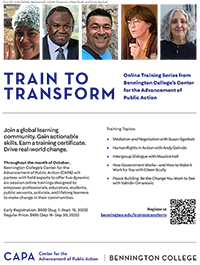
Expand Each Below to View the Trainings
Mediation and Negotiation
Instructor: Susan Sgorbati
Mondays and Wednesdays 7:00–9:00 pm EST October 6, 8, 13, 15, 20, and 23.
This training includes the basic skills in the practice of mediation and negotiation. An important addition will be an understanding of complex systems analysis in dealing with challenging conflicts. Negotiation skills include the difference between adversarial and collaborative negotiation, defining one's interests and effective negotiation strategies. Mediation skills include the practice of a third impartial facilitator, an understanding of the formal mediation structure, how to reframe conflicts based on shared interests, and the concept of emergent structuring.
Register for this training.
Human Rights in Action
Instructor: Andy Galindo
Tuesday and Thursday 6:00–8:00 pm EST, October 7, 9, 14, 16, 21, and 23
This training is designed to move beyond theory and bring human rights to life. We’ll start by exploring what human rights are and how they are protected at the international level. Then, you’ll learn how to put those rights into action by developing your own campaign plan—selecting an issue that matters to you, setting clear objectives, identifying your target audience, and defining concrete, measurable actions. By the end of the training, you’ll have the tools and confidence to drive real change in your community.
Intergroup Dialogue: The Art and Practice of Having Difficult Conversations Across the Lines of Difference
Instructor: Maurice Hall
Tuesdays and Thursdays 7:00–9:00 pm October 7, 9, 14,16, 21, and 23.
This course is designed to teach basic facilitation skills that are integral to having constructive conversations about differing political and cultural perspectives, as well as difficult conversations about communicating from diverse identity standpoints. Facilitation skills are also crucial for being an effective leader in or of a group, crucial for being an advocate for challenging social issues, and crucial for managing or mediating conflict. The class will explore the social theory behind dialogue processes, and will teach you the basic skills of effective facilitation for a wide variety of contexts and situations. The focus on the class will be on discussion with a heavy emphasis on experiential learning.
How Government Works—and How to Make It Work for You
Instructor: Eileen Scully and Brian Campion
Tuesdays and Thursdays 6:30–8:30 pm EST October. 7, 9, 14,16, 21, and 23
Using a framework of backward design, participants will begin by imagining the civic change they want to see in their own communities, as if they’ve already achieved it. Then, over the course of six sessions, they’ll reverse-engineer the timeline, tools, and tactics required to make that change a reality. Each session develops practical civic skills while deepening understanding of how local, state, and federal systems function—with a special focus on how governance varies across different regions of the United States. Because participants come from different localities, the course invites comparative discussion, shared strategy-building, and locally tailored Civic Action Plans.
Register for this training.
Peace Building: Be the Change You Want to See in the World
Instructor: Vahidin Omanovic
Tuesdays and Wednesdays from 5:00–7:00 pm EST October 7, 8, 14, 15, 21, and 22.
This training includes gaining basic skills in dialogue participation and facilitation as well as a healing journey for each participant. The training includes the ability to face obstacles gained through the wounds of the past. We will explore how our identities and prejudices can limit us in daily life and also how to transform negative experience into personal growth. Additionally, we will explore how and why we can learn to forgive.
Meet your instructors
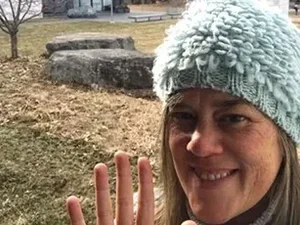
Andy Galindo is an international Human Rights Lawyer, working as an independent consultant. She has been teaching human rights and training human rights defenders, members of international and regional organizations and government officials from all over the world, in the use of international human rights mechanisms and strategic litigation.
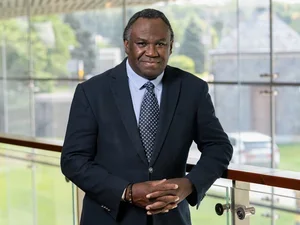
Maurice L. Hall, Ph.D., Dean at Marist University, is a communication scholar specializing in leadership, media, and intergroup dialogue. He holds advanced degrees from Howard University and has published award-winning work on Caribbean identity and postcolonial culture. His research bridges the arts, media, and communication to empower marginalized communities.
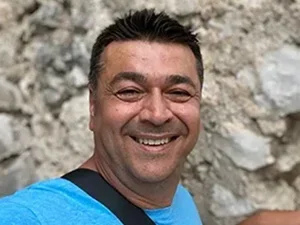
Vahidin Omanovic is a globally recognized peacebuilder and co-founder of the Center for Peacebuilding in Bosnia and Herzegovina. He has led conflict transformation trainings worldwide and received multiple international peace awards. A frequent Bennington faculty member, he specializes in forgiveness, dialogue, and healing in post-conflict and divided communities.
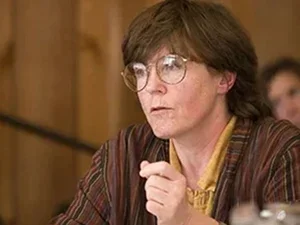
Eileen Scully is an award-winning scholar of American diplomacy and international history. Her recent work explores historical understandings of human trafficking and international customary law on the coming, going, and staying of destitute, physically disabled migrants.
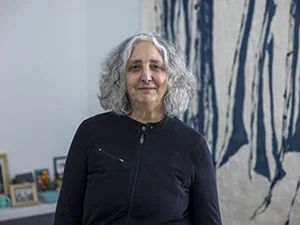
Susan Sgorbati is the director of the Center for the Advancement of Public Action and Interim Director of the MFA in Public Action. She is a professional mediator and educator whose creative research has led to collaboration across disciplines and borders as both an artist and a driver of social change.
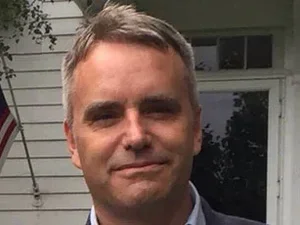
As director of Public Policy Programs at CAPA, Brian Campion oversees state and federal initiatives. He served in the Vermont Legislature from 2010–2025, including roles as Senate Education Chair and on key committees. He was recently appointed to the State Board of Education and is a visiting faculty member at Bennington.
For course questions, contact capa@bennington.edu
For registration/payment help, contact dana@intempio.us
The class is part of the Center for the Advancement of Public Action’s Activating Democracy programs